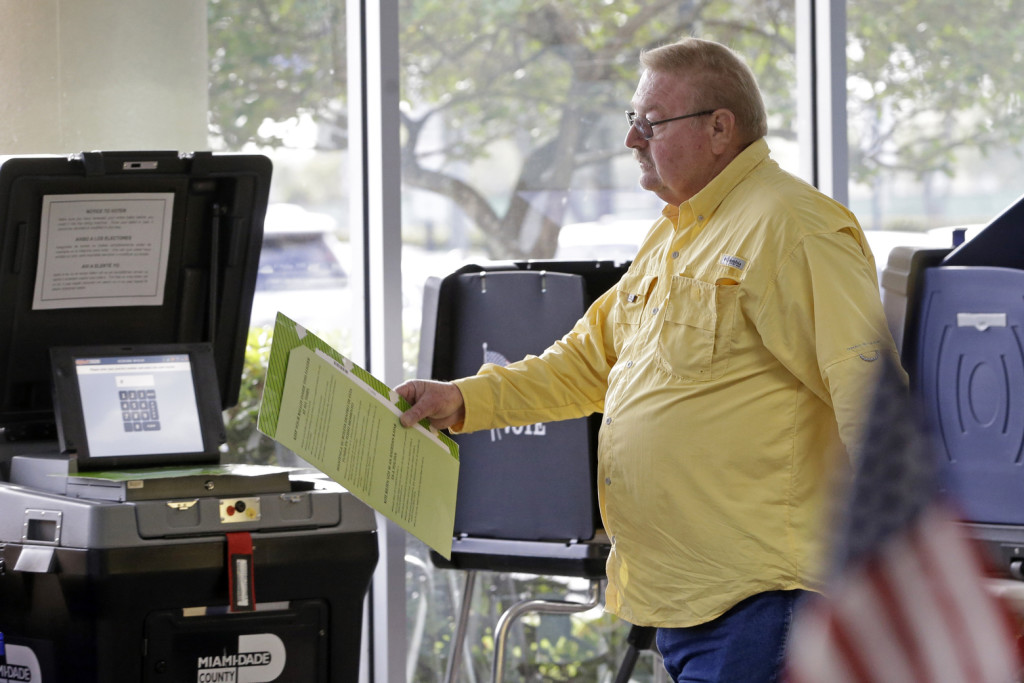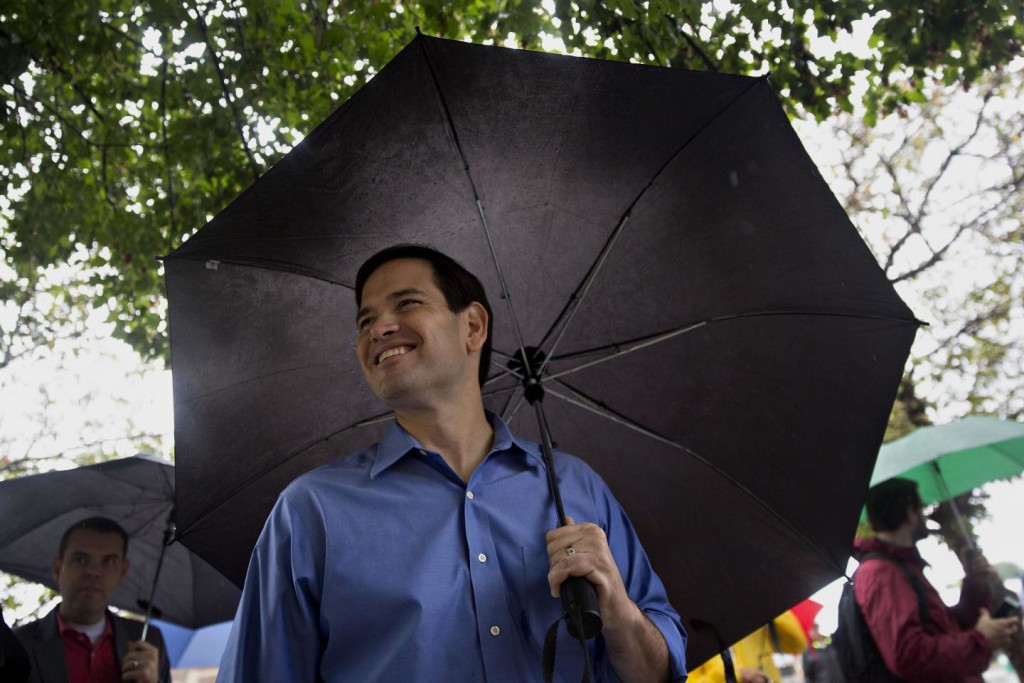As Florida votes, there’s a difference between north, south

There’s a big difference between north Florida and South Florida. As different as Alabama and New England. And on Tuesday, those distinctions will likely play out as Florida voters decide who to give 99 Republican delegates to in the race for president. The Florida GOP primary is considered a pivotal moment in the campaign: The winner-takes-all contest could mean a huge boost for Donald Trump, or the death of Marco Rubio‘s campaign in his home state. But the Florida primary isn’t easy to predict. The differences between residents in Bonifay in north Florida and those in Broward County in south Florida are about as stark as voters in Birmingham, Alabama, with those in Boston, Massachusetts. In Bonifay in Holmes County in the north, there’s a sign pointing to a bait shop three miles down the road intermingled with campaign signs for sheriff, school superintendent and property appraiser. They don’t like Democrats even if they are Democrats (because they are Dixiecrats). Nobody blinks if a Confederate battle flag waves in front of a home and people driving off Interstate 10 might think they’re in Alabama, which borders the largely rural community. A day’s drive south is Broward County. Broward is a place where it can take hours to get off Interstate 95 during rush hour, people speak with New York accents and President Barack Obama won enough support to cancel out dozens of places like Bonifay to carry Florida and win two terms as president. In north Florida, boiled peanuts are commonplace. In South Florida, you’re more likely to find boiled yucca, a staple in Cuban restaurants. And on Tuesday, when Florida awards 99 delegates to either Donald Trump, favorite son Sen. Marco Rubio or, much more unlikely, Sen. Ted Cruz or Ohio Gov. John Kasich, there’s a good chance there will be a difference in who north Florida supports and who prevails in the three-county area known as South Florida. “We’re more in line with south Alabama, frankly, than we are below the I-4 corridor,” Dan Smith, chairman of the Holmes County Republican Party, said about the highway that divides Florida in half from Tampa to Daytona Beach. “It comes from our roots. Conservative values and family values.” Holmes County in the north, which includes Bonifay, actually has more Democrats than Republicans, but many are Dixiecrats — Southerners who register as Democrats but vote Republican. Despite the party advantage, Barack Obama earned only 15.2 percent of the vote in 2012. Smith takes pride in saying Holmes County gave more support to Marco Rubio’s 2010 Senate campaign than any other Florida county. But this year, he said the vote in the Republican primary will be close. He agrees that the primary results in Georgia and Alabama, which Trump easily won, could indicate the businessman and reality TV star will do well in north Florida. Exactly why a New Yorker is winning the hearts of Southern voters is something of a mystery. “You’ve got me there,” Smith said. “It’s like a Trump phenomenon.” Rubio will probably do better in South Florida, the state’s most populous region, with more than 800,000 Republicans in Palm Beach, Broward and Miami-Dade Counties. Rubio is from Miami, where the population in his home county outnumbers Holmes by a better than 131-to-1 ratio. Even throw in conservative strongholds like Jacksonville and Pensacola and South Florida votes dominate the state, and tend to be a bit more liberal even among Republicans. Maria Penton-Oliver, of Davie, a city southwest of Fort Lauderdale in Broward County, has already voted for Rubio. She’s no fan of Trump. She said she has “100 reasons” not to vote for the billionaire. She thinks Trump speaks “from both sides of his mouth,” saying that the billionaire businessman talks tough about immigration but takes advantage of the H1-B program to hire foreign workers at his Mar-A-Lago resort in nearby Palm Beach County. “I don’t think he understands our country,” she said. “I do not think he’s an honest man. And I think, like Rubio says, he’s a con artist.” Not that Rubio won’t get any support up north. Jerre Richter stood on her porch in Bonifay and said she’s voting for him because she thinks that’s who God would think makes the best president. She said her faith plays a large part in casting her vote. But the 83-year-old former teacher and current pastor said there are plenty of others willing to cancel out her vote. “Somebody said to me the other day, ‘Who are you voting for?’ And I said my current plan was to vote for Rubio. And they said some junk about him not being from the United States. I don’t remember the term they used, but like he was a foreigner. I said, ‘What difference does that make? It’s more the man, what he stands for, what he is and what’s he going to do,’” Richter said. She said one neighbor pleaded with her: “‘You must be for Trump! You must be for Trump!’ She was talking like he was God sent to resurrect the nation.” Republished with permission of the Associated Press.
Florida’s winner-take-all primary could kill Marco Rubio’s chances

Florida’s winner-take-all Republican presidential primary was supposed to help former Gov. Jeb Bush or Sen. Marco Rubio. That was the thinking when the GOP-dominated Legislature changed the state’s primary date to the third Tuesday in March – the earliest date it could hold an election that will award all 99 Republican delegates to one candidate. But that was before Republicans here even dreamed of – or had nightmares about — businessman and reality TV star Donald Trump possibly winning the state. It was before Bush went from front-runner to dropout and Rubio began losing whatever momentum he had after poor debate performances. Now the very plan to wrap up the nomination for a favorite son could be the one that kills his campaign. “There’s no question that the decisions that were made were made to benefit the two main Florida sons – Bush and Rubio,” said Joe Gruters, vice chair of the Republican Party of Florida and co-chair of Trump’s Florida campaign. “I’m sure they weren’t expecting the Trump movement to be so strong. This is exactly the opposite of what they wanted. Instead of giving a crushing blow to everybody else, it’s delivering a crushing blow to the very people it was meant to help the most.” Florida defied the national GOP in 2008 and 2012 and held its presidential primary on the last Tuesday in January in an effort to push its candidate of choice forward before most other states voted. It worked. Florida helped propel Sen. John McCain and former Massachusetts Gov. Mitt Romney to nomination in those years. But Florida was faced with losing all its delegates if it broke national party rules again, and in 2013 the Legislature moved the primary date to the first Tuesday in March. Last year, as Rubio and Bush were preparing to run, the Legislature voted to move the date again to make the contest winner-take-all, which the state GOP approved after Gov. Rick Scott signed the bill into law. Not everyone thought it was a good idea, including the Florida Federation of Republican Women. “The Republican women had looked at trying to do the delegates by congressional district, and we were just told there wasn’t even a starter on that conversation,” said Cynthia Henderson, the group’s past president. “I was told from very high up that we were not talking about that.” But she also said, with a sigh and a big roll of her eyes, that it might not matter at this point because of Trump’s lead in the race. “My guy’s not in it, so I don’t care who wins,” said Henderson, who was supporting Bush. Gruters pointed out that Trump, who has a home in Palm Beach and several business ventures here, is hardly an outsider in the state. “Donald Trump is basically a Floridian. He’s spent so much time here, he’s invested tens of millions of dollars in properties, he’s employed thousands of people. He laid the groundwork early when you think about him going to local GOP dinners since 2012,” Gruters said. “He’s really done what’s necessary to win Florida.” The winner-take-all GOP primary has some Democrats snickering at the possibility of a Trump victory that would push Rubio out of the race. The Democratic primary between Hillary Clinton and Sen. Bernie Sanders will award delegates proportionally. “Republicans in the Legislature have effectively knee-capped Rubio’s chances of obtaining the nomination and they have no one to blame but themselves. Yet again, Republican legislative chicanery has backfired to their very public embarrassment,” said Florida Democratic Party spokesman Max Steele. “We eagerly await the strong, vocal support Florida Republicans will offer their party’s standard-bearer, Donald Trump.” Republished with permission of the Associated Press.


